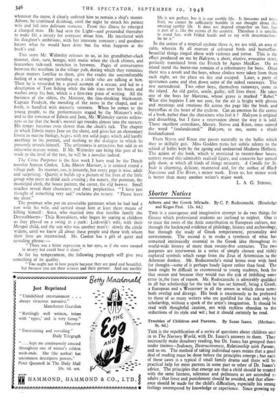Shorter Notices
Tuts is a courageous and imaginative attempt to do two things for Greece which professional students are inclined to neglect. One is to trace the roots of the Attic contribution to European culture, not through the hackneyed evidence of philology, history and archaeology, but through the study of Greek temperament, personality -and environment. The second is to evoke a synthesis of what has remained intrinsically essential to the Greek idea throughout its world-wide history of more than twenty-five centuries. The two purposes are interwoven in a series of simply chosen and richly explored symbols which range from the Zeus of Artemision to the Athenian donkey. Mr. Rodocanachi's mind brims over with food for thought—some of it perhaps heady liquor rather than food. The book might be difficult to recommend to young students, both for that reason and because they would run the risk of imbibing some error in.the feast of reason. Mr. Rodocanachi is admirably qualified in all but scholarship for the task he has set himself, being a Greek, a European and a Westerner in all the senses in which those terms both overlap and diverge. His book is enormously to be preferred to those of so many writers who are qualified for the task only by scholarship, without a spark of the artist's imagination. It should be read with thoughtful caution, not with reckless abandon to the seductions of its style and wit ; but it should certainly be read.


































 Previous page
Previous page